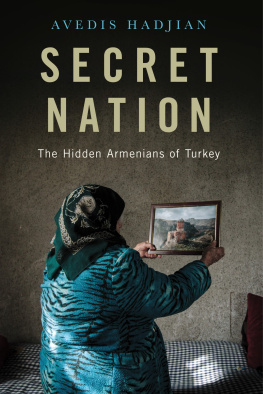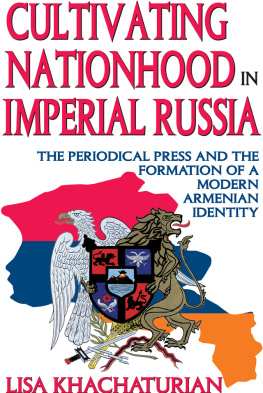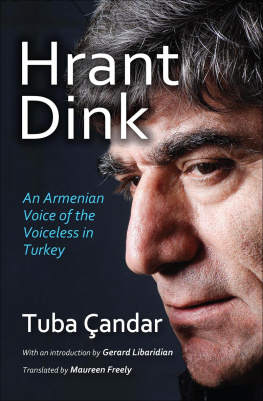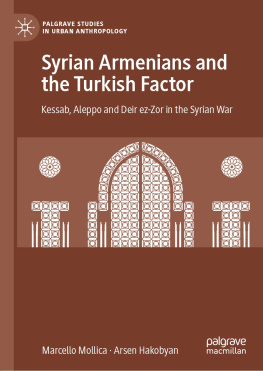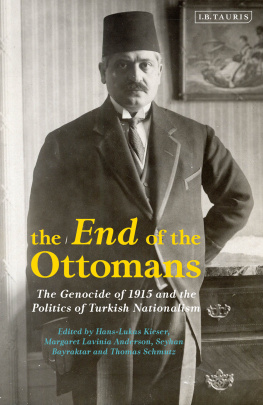Avedis Hadjian is a journalist and writer based in Venice. His writing has appeared in the
Los Angeles Times and
Le Monde Diplomatique, and on Bloomberg News, among other international news outlets. His work as a correspondent has taken him to Eastern Europe, the former Soviet Union, China, the Caucasus, Turkey, and Latin America. He was educated in Buenos Aires and Cambridge.
A fascinating and valuable piece of work. Based on a very large number of encounters and interviews with people in Turkey, it gradually builds a kind of group portrait of the Armenian community in Turkey. This community has indeed been a hidden nation for almost a century in the sense that almost all surviving Armenians in Turkey have converted to Islam and been submerged into the larger Turkish or Kurdish Muslim communities. Yet, to a surprising extent, a consciousness of being Armenian has survivedeven among people who have no Armenian and have now been Muslims for the best part of a century. The records of the fieldwork in the form of descriptions of encounters and conversations are fascinating the account is well written, very lively and fluid.
Erik J. Zrcher, Professor of Turkish Studies, University of Leiden and author of Turkey: A Modern History (I.B.Tauris, 2017)
Avedis Hadjians work on the descendants of Armenians still living in the eastern provinces of Turkey or established in Istanbul crosses history and memory. The author invites us to dive into a multiple world where memory is much more alive than one could have imagined. Those Turkish citizens who often want to forget their families pasts escape the stigma attached to their infamous origins and hide themselves to form a secret nation. In other words, they do not give themselves up easily. This requires establishing a climate of trust. The author, a remarkable polyglot, who even managed to assimilate the Hamshen dialect, was thus gradually able to establish a strong link with his interlocutors. Those who want to understand what mass violence has engendered in Turkish society must read this bookwhich is indisputably the most accomplished investigationan image of a world tortured from within by its memory.
Raymond H. Kevorkian, Honorary Director of Research, University Paris 8 and author of The Armenian Genocide: A Complete History (I.B.Tauris, 2013)
In a courageous, daring journey of discovery and recovery, the journalist Avedis Hadjian moved for years through eastern Turkey to seek out the remnants of the sword, those whose ancestors had survived the Armenian Genocide of 1915, who in most cases converted to Islam, and were wary but willing to speak of their familys experience. Eastern Anatolia is the contested geography where historic Armenia meets a present and future Kurdistan while both remain firmly under the gaze of the Turks. Hadjians vivid and varied portraits reveal layers of tragic loss and survival that testify to the perseverance and resilience of ordinary, extraordinary people.
Ronald Grigor Suny, William H. Sewell Jr. Distinguished University Professor of History at the University of Michigan and author of They Can Live in the Desert But Nowhere Else: A History of the Armenian Genocide (2015)
Time opened a window and light transpersed one of the darkest secrets of the Middle East: that of the surviving Armenians left behind after the mass deportations and massacres, continuing to live over their historic land, living in a state of denial. The window of time has closed since, with Turkish politics hardening again, devouring more of its children. Yet, it left behind voices of survivors in the form of oral histories collected in various forms. Among them Avedis Hadjians remarkable book Secret Nation is the most complete narrative on the life and fate of Islamized Armenians.
Vicken Cheterian, author of Open Wounds: Armenians, Turks, and a Century of Genocide (2015)
The Armenian Genocide of 191516 has one great untold story. This is that there may be as many as two million Islamicized Armenians living in Turkey, whose grandparents and great-grandparents survived the death marches and massacres and were incorporated into Kurdish and Turkish families, often by force. To uncover the secrets and tell this story requires great perseverance, erudition and great sensitivity. This is what Avedis Hadjian has done in this remarkable, vivid and quite eccentric book. His research is impressive and the stories he tells extraordinary and moving.
Thomas de Waal, Senior Fellow, Carnegie Europe
Deeply reported, and written with empathy and erudition, Secret Nation will prove to be an enduring work of journalism on the subject of ethnic slaughter and its long aftermath. Based on relentless travel across the Turkish countryside, the book examines a people who, for more than a century, have carried with them a liminal, quasi-clandestine heritage shaped by the legacy of the Armenian Genocide, and its official state denial. Avedis Hadjian moves through Anatolias wounded landscape like a storyteller from the novels of W. G. Sebald, weighted by history, and compelled to excavate the connective tissue between present and past, trauma and acceptance.
Raffi Khatchadourian, staff writer at the New Yorker

This publication was made possible
by a generous grant from the
Dolores Zohrab Liebmann Fund
Published in 2018 by
I.B.Tauris & Co. Ltd
London New York
www.ibtauris.com
Copyright 2018 Avedis Hadjian
The right of Avedis Hadjian to be identified as the author of this work has been asserted by the author in accordance with the Copyright, Designs and Patents Act 1988.
All rights reserved. Except for brief quotations in a review, this book, or any part thereof, may not be reproduced, stored in or introduced into a retrieval system, or transmitted, in any form or by any means, electronic, mechanical, photocopying, recording or otherwise, without the prior written permission of the publisher.
Every attempt has been made to gain permission for the use of the images in this book. Any omissions will be rectified in future editions.
References to websites were correct at the time of writing.
ISBN: 978 1 78831 199 1
eISBN: 978 1 78672 371 0
ePDF: 978 1 78673 371 9
A full CIP record for this book is available from the British Library
A full CIP record is available from the Library of Congress
Library of Congress Catalog Card Number: available
Text design, typesetting and eBook by BBR Design, Sheffield
eBook generated with BBR TextFlow
1786723719.20180430
Jacket illustration: Yepraksia holds an image of the location from where she recalls escaping with her family. This is the first time she has seen it in 100 years (from 1915 project). (Diana Markosian/Magnum)
Jacket design: Alice Marwick
For my father and for Kirkor MenafThe harsh iron age was last. Immediately every kind of wickedness erupted into this age of baser natures: truth, shame and honor vanished; in their place were fraud, deceit, and trickery, violence and pernicious desires.
Ovid, The Metamorphoses
Kl artklar
The leftovers of the sword, a Turkish expression employed to describe Armenian survivors of the Genocide who stayed on in the ancestral lands, especially women married off to Muslim men and forcibly converted to Islam.
Contents

